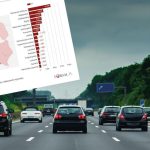These conclusions result from the discussion panel “The new liquid fuel market”, which took place during the European Economic Congress in Katowice. It was attended by (in alphabetical order): Maciej Bando, Undersecretary of State, Deputy Minister of Climate and Environment, government plenipotentiary for strategic energy infrastructure, Bogdan Kucharski, president of BP in Poland, Adam Sikorski, president of Unimot, Mirosław Skowron, energy market expert ( until recently the president of PERN), Daniel Świętochowski, director of PERN's commercial department, and Karol Wolff, director of the strategy and strategic transformation office in Orlen. The panel moderator was Michał Krawczyk, director at the Kearney consulting company.
The beginning of the discussion clearly showed that the scenario on the liquid fuel market is determined by events on the transport market as well as regulations. The economic calculation is ruthless, this is best seen in heavy transport. Customers ordering transport are interested in the price. They won't pay more than they have to to protect their competitive position. And ecology costs money.
There is an unclear situation on the electric car market, where there is information about reported sales declines. He drew attention to this, among others: Maciej Bando.
He also talked about recent plans for the very dynamic development of the electric car market in Poland in the context of ignoring the needs that it would bring in terms of electricity generation and ensuring an appropriate transmission network.
– I don't know what the future will be, but I know that the trend is emission-free. Whoever I talk to from the fuel industry, I hear: we have to think about what we will do in 10 years and 30 years, said Maciej Bando.
He also gave an example of PERN's new strategy, which clearly indicates that the transmission system is moving away from oil to fuels, but at the same time new opportunities are emerging.
– This applies to both the transmission and petrochemical sectors. More and more chemicals are entering this industry, more and more hydrogen, more and more third generation fuels, biofuels – said Maciej Bando.
Daniel Świętochowski referred to this when talking about PERN's plans to build a chemical terminal.
– We will look at developing markets. It is no secret that we are thinking about a chemical terminal in Siarkopol, this is a facility within our capital group, we would like to create a fuel hub there, or rather a chemical hub – said Daniel Świętochowski.
He pointed out that in the context of the future, we are talking about ammonia, methanol and glycol.
Karol Wolff, director of the strategy and strategic transformation office in Orlen / Press materials / Studio3df.pl
Karol Wolff talked about the approach to change and the actions taken in connection with it by the largest Polish company, Orlen.
– If we talk about an emission-free future, we see that in Poland in 2050, 50 percent transport fuels will be fossil fuels. Heavy transport will be difficult to decarbonize. According to our estimates, by 2050, 80 percent. trucks will be diesel-powered. Currently, we do not see any clear possibilities of replacing it, said the director of the strategy and strategic transformation office in Orlen.
He added that, of course, passenger transport is also changing, first the fleet is being replaced with hybrid cars, then it will be time for electric ones. The most likely business scenario forecast by Orlen is that from 2035 there will be no sales of new vehicles with combustion engines in Europe.
– This forces a certain change in business models. We have no uncertainty about the direction, only uncertainty about the pace of change. The most important thing about what is happening now and what we are implementing at Orlen is to adapt the introduction of new business models such as chargers, electromobility, fuels based on plant origin – biofuels, so that they are a response to the needs of the market and, at the same time, a response to the needs of regulations. – declared Karol Wolff.
He assessed the electromobility market in Poland as one whose development was progressing at a moderate pace, but now it is changing, the number of electric cars in light delivery fleets is increasing.
– Fast chargers are emerging, which allow for a change in the charging business model, where you can refuel your car up to 80 percent. within 10-15 minutes and it is possible to build fast charging hubs. These are models that we, as Orlen, will also explore in the future, said Karol Wolff.
Answering the question from the moderator of the discussion, Orlen's representative confirmed that the new fuel use balance, a 50/50 ratio forecast for 2050, creates opportunities for Poland to become a fuel exporter.
– The trend of reduced demand for liquid fuels is clear, but it will be stronger in Western Europe. The refinery in Płock will be one of the longest-operating refineries in Europe and will operate after 2050. It will meet the last remaining demand for fuels, within a slightly larger radius than currently – shared Karol Wolff's forecasts.
As he added, 50 percent for green. will consist of a mix of electricity, biofuels and synthetic fuels.
Maciej Bando drew attention to a certain conservativeness in the operation of fuel companies, compared, for example, to the electricity sector. Representatives of fuel companies said that taking dynamic actions is not that easy. PERN, for example, is to guard the energy security of Poland, and thus also of the European Union.
– Our perspective is embedded in the realities of the market in which we operate. Four years ago, we announced that we wanted to achieve emission neutrality by 2050. Since then, we have been preparing decarbonization plans, watching how markets will behave and how assets will behave. And while we see that the power industry is able to change production sources faster, in the case of transport, where we are dealing with the purchasing decisions of households and entrepreneurs, the change is the result of their choices – said the representative of Orlen.
Replacing a fleet of vehicles takes a certain amount of time.
– We follow the market – concluded Bogdan Kucharski.
– I agree. The future will be a mix of solutions based on existing and new fuels. And this is what we have to switch to. We must be prepared for various scenarios, we do not know the exact pace of changes, said Karol Wolff.



